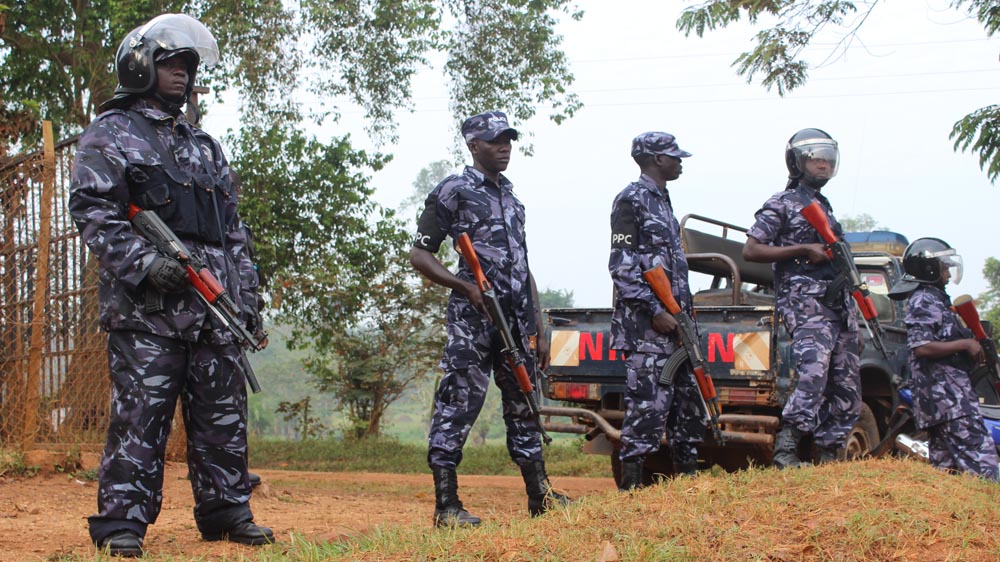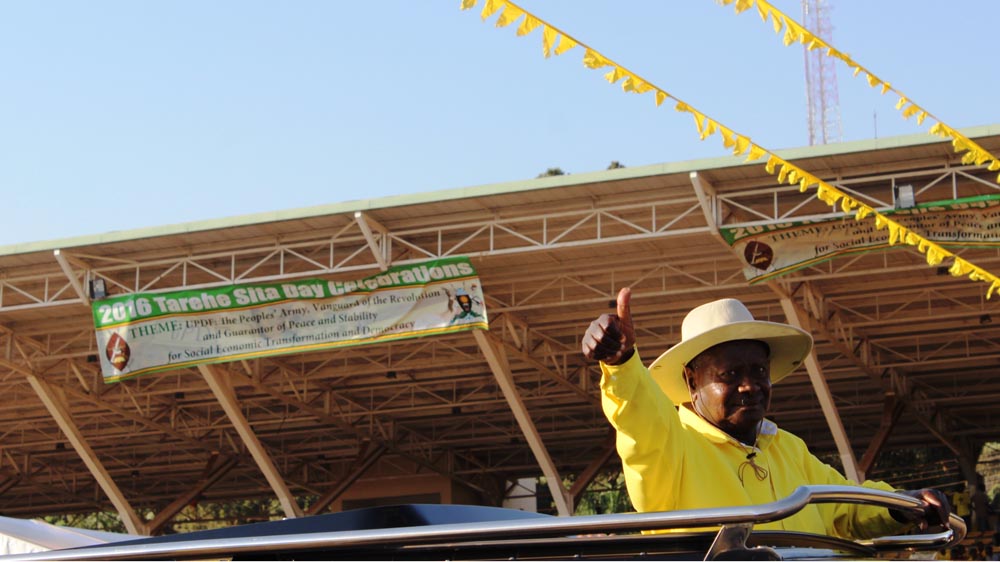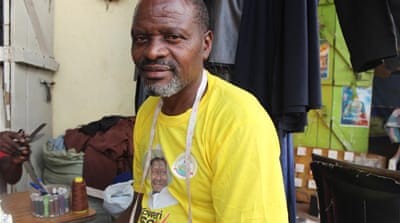Kampala, Uganda - A group of security guards huddled
around a small mobile phone on speaker, listening closely to the radio
programme discussing the nation's political conundrum. At times they
nodded in agreement, or interjected in disagreement with the host's
views on the controversy over Uganda's recently held parliamentary and presidential polls.
President Yoweri Museveni has won a fifth term in office, but not everyone in Kampala, the capital, is happy with the victory of the ruler who has been in power for 30 years.
These men feel robbed.
"My heart is not OK. The way the government treats Dr Besigye makes me think he won the election and the Electoral Commission cheated us," said Freddy Matuwa.
"But we will mobilise and find a new way to remove this man, Museveni, from power," he resolved.
Arresting the opposition
On at least five occasions in just over a week Kizza Besigye, the leader of Uganda's largest opposition movement, the Forum for Democratic Change (FDC), was placed under "preventive arrest" in his home and in jail.
In the latest incident on Monday, February 22, the 59-year-old opposition veteran, who had been under house arrest since Friday, was taken into police custody when he attempted to leave his home and join supporters. Besigye had planned to march with them to the Election Commission to demand an official tally of the results while disputing of Museveni's 60.7 percent win. He was subsequently returned to his home and placed under house arrest again.
A security measure with its roots in colonial law and codified in Section 24 (1) of the current Police Act, gives law enforcers the power to arrest or detain a person if they pose a threat to themselves or others.
According to police spokesman Kale Kayihura, Besigye had broken several laws and posed a threat to the public.
"He has violated Section 5 of Public Order Management Act by calling
for a procession without notifying the police, so he has committed a
crime," Kayihura explained. "The man behaves with impunity, he wants to
create violence in this city and we cannot allow that."
Besigye, who is no stranger to such arrests, has challenged the constitutionality of both laws - Section 24 (1) of the current Police Act and Section 5 of Public Order Management Act - but his efforts have yielded no results.
Local groups such as the Ugandan Human Rights Commission strongly criticise the statutes.
Maria Burnett, a senior researcher in the Africa division of Human Rights Watch, told Al Jazeera that Besigye's multiple detentions were unconstitutional.
"The ongoing 'preventive' detention of Dr Besigye is a clear violation of international human rights law and an unconstitutional form of detention without trial or prospect of trial," Burnett said. "The Police Act provision which is used to justify preventive detention of the opposition leadership is misleading and inapplicable to the factual reality."
The power of the people
The cat-and-mouse game between police and Museveni's strongest challenger not only draws concern over the legality of preventive custody, but also raises questions over the FDC's actual capacity to mobilise mass protests.
While the 71-year-old Museveni has dismissed the opposition's claims of a fraudulent win as the acts of "demagogues and liars" seeking attention, the FDC continues to call for an international audit of the results.
Besigye has also appealed to the international community not to recognise the re-election of the incumbent regime.
Yet, despite strong international condemnation of how the opposition has been treated, some analysts are doubtful of the FDC's ability to evoke international sanction of the Museveni regime or stir up mass action as the police fear.
Magnus Taylor, Horn of Africa specialist observing Uganda's polls for the International Crisis Group, expressed scepticism over Besigye's various calls to action.
"The EU electoral observers criticised the Election Commission's processes, but they didn't say the election was rigged and they pretty much signed off on the results, so nothing may come of Besigye's calls, Taylor said.
"This could be an opportunity to get the supporters out into the streets, however," he said. "But, with the extreme level of securitisation evident at the moment, I don't anticipate this drawing big crowds."
One last term
Although everyday business has resumed in Kampala, security checkpoints and armed patrols can be seen across the capital.
Post-election, police have twice stormed the FDC headquarters, arresting officials and seizing party election materials. While confrontations between the opposition and the security forces could continue long after the election period, Taylor points out that these "tactics of frustration" are unsustainable for the Museveni regime.
"He can continue these tactics, but there must come a point at which a critical mass of opposition is reached and it becomes too expensive to keep winning in this way. This was a very expensive election and there are presumably some in the National Resistance Movement [NRM] thinking: was it really worth it?
"This question will become even more pertinent when 2021 rolls
around and his party may have to change the constitution if Museveni
wants to stand again," he explained.
Running for a sixth term may still be a distant possibility for Museveni, but even some of his supporters feel this should be his last term.
Victor Basigiri is a longtime supporter who has voted for the incumbent in every election. But even this 52-year-old tailor wants Museveni to step down in 2021.
Standing on a dusty street in Kamwokya, a ghetto near central Kampala, Basigiri said: "I want him in charge, but I don't like what he's doing to the opposition.
"We've already given him the power. Museveni could be president for 35 years, but after this term he should sit down and rest."
President Yoweri Museveni has won a fifth term in office, but not everyone in Kampala, the capital, is happy with the victory of the ruler who has been in power for 30 years.
These men feel robbed.
"My heart is not OK. The way the government treats Dr Besigye makes me think he won the election and the Electoral Commission cheated us," said Freddy Matuwa.
"But we will mobilise and find a new way to remove this man, Museveni, from power," he resolved.
Arresting the opposition
On at least five occasions in just over a week Kizza Besigye, the leader of Uganda's largest opposition movement, the Forum for Democratic Change (FDC), was placed under "preventive arrest" in his home and in jail.
In the latest incident on Monday, February 22, the 59-year-old opposition veteran, who had been under house arrest since Friday, was taken into police custody when he attempted to leave his home and join supporters. Besigye had planned to march with them to the Election Commission to demand an official tally of the results while disputing of Museveni's 60.7 percent win. He was subsequently returned to his home and placed under house arrest again.
A security measure with its roots in colonial law and codified in Section 24 (1) of the current Police Act, gives law enforcers the power to arrest or detain a person if they pose a threat to themselves or others.
According to police spokesman Kale Kayihura, Besigye had broken several laws and posed a threat to the public.
 |
| Opposition leader Kizza Besigye is escorted by Ugandan policemen to a police vehicle outside his house at the outskirts of Kampala [Reuters] |
Besigye, who is no stranger to such arrests, has challenged the constitutionality of both laws - Section 24 (1) of the current Police Act and Section 5 of Public Order Management Act - but his efforts have yielded no results.
Local groups such as the Ugandan Human Rights Commission strongly criticise the statutes.
Maria Burnett, a senior researcher in the Africa division of Human Rights Watch, told Al Jazeera that Besigye's multiple detentions were unconstitutional.
"The ongoing 'preventive' detention of Dr Besigye is a clear violation of international human rights law and an unconstitutional form of detention without trial or prospect of trial," Burnett said. "The Police Act provision which is used to justify preventive detention of the opposition leadership is misleading and inapplicable to the factual reality."
 |
| Police surround the entrance to Kizza Besigye's house in Kasangati as a way of keeping the opposition leader under preventative arrest [Tendai Marima/Al Jazeera] |
The cat-and-mouse game between police and Museveni's strongest challenger not only draws concern over the legality of preventive custody, but also raises questions over the FDC's actual capacity to mobilise mass protests.
While the 71-year-old Museveni has dismissed the opposition's claims of a fraudulent win as the acts of "demagogues and liars" seeking attention, the FDC continues to call for an international audit of the results.
Besigye has also appealed to the international community not to recognise the re-election of the incumbent regime.
Yet, despite strong international condemnation of how the opposition has been treated, some analysts are doubtful of the FDC's ability to evoke international sanction of the Museveni regime or stir up mass action as the police fear.
Magnus Taylor, Horn of Africa specialist observing Uganda's polls for the International Crisis Group, expressed scepticism over Besigye's various calls to action.
"The EU electoral observers criticised the Election Commission's processes, but they didn't say the election was rigged and they pretty much signed off on the results, so nothing may come of Besigye's calls, Taylor said.
"This could be an opportunity to get the supporters out into the streets, however," he said. "But, with the extreme level of securitisation evident at the moment, I don't anticipate this drawing big crowds."
 |
|
President Museveni flashed the party sign to crowds at his last
pre-election rally at Kololo airstrip in Kampala, Uganda [Tendai
Marima/Al Jazeera] |
Although everyday business has resumed in Kampala, security checkpoints and armed patrols can be seen across the capital.
Post-election, police have twice stormed the FDC headquarters, arresting officials and seizing party election materials. While confrontations between the opposition and the security forces could continue long after the election period, Taylor points out that these "tactics of frustration" are unsustainable for the Museveni regime.
"He can continue these tactics, but there must come a point at which a critical mass of opposition is reached and it becomes too expensive to keep winning in this way. This was a very expensive election and there are presumably some in the National Resistance Movement [NRM] thinking: was it really worth it?
 |
| NRM supporter Victor Basigiri is glad Museveni won but hopes this will be the veteran leader's fifth and last term in office [Tendai Marima/Al Jazeera] |
Running for a sixth term may still be a distant possibility for Museveni, but even some of his supporters feel this should be his last term.
Victor Basigiri is a longtime supporter who has voted for the incumbent in every election. But even this 52-year-old tailor wants Museveni to step down in 2021.
Standing on a dusty street in Kamwokya, a ghetto near central Kampala, Basigiri said: "I want him in charge, but I don't like what he's doing to the opposition.
"We've already given him the power. Museveni could be president for 35 years, but after this term he should sit down and rest."
No comments:
Post a Comment